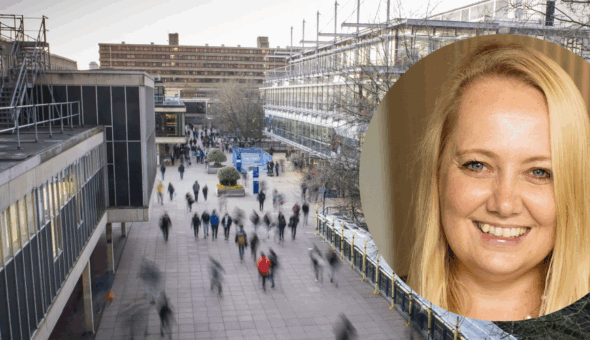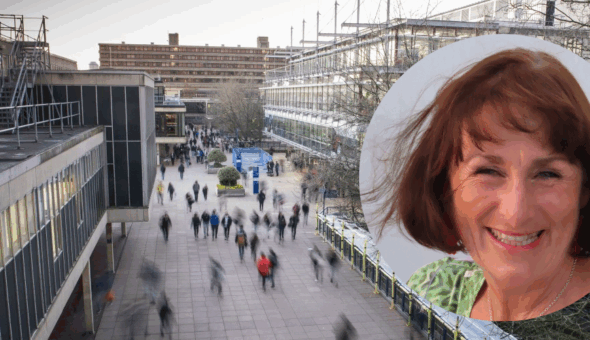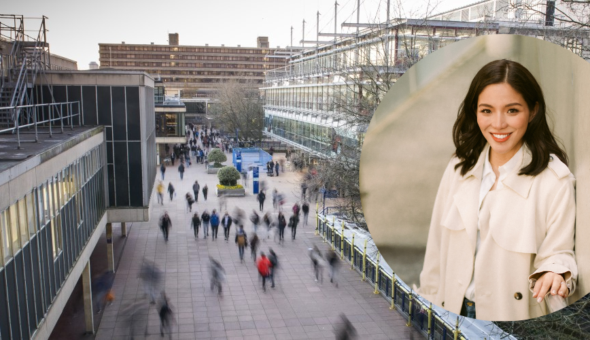Dr Jack Whitehead came to Bath to study education and has gone on to develop his educational theory in universities around the world as a visiting professor. He was recently recognised for his contributions to the field with an honorary doctorate from the University of Worcester. We caught up with him about his 39-year tenure at Bath.

Why did you initially choose to work at Bath?
In 1973, after six years teaching science to 11–18-year-olds in London comprehensive schools, my sense of vocation changed as I realised that there were limitations in the dominant view of educational theory.
I was Head of Science at Erkenwald Comprehensive School in Barking and the inspectorate had provided me with a video camera and recorder to explore its educational potential in the science department. I was also tutoring students from North East London Polytechnic in the science department, contributing lectures to the initial teacher education course.
These experiences led to my desire to research and teach in higher education, with an interest in educational technology. The University of Bath’s Department of Education offered an opportunity for me to develop my research into helping to reconstitute educational theory with this focus.
As your doctorate is in education, what's your opinion about the teaching quality at Bath?
The teaching quality at Bath was best represented in the University’s Mary Tasker Award for teaching. Mary was a colleague for many years and always emphasised the importance of the quality of teaching in the Department of Education.
What stands out in my experience as unique to Bath was the provision of the most up-to-date access to the educational technologies that could be used to support our teaching and research.
This was combined with unparalleled financial support to attend and present at international conferences, to test the validity and enhance the international standing of our research.
Describe your career journey before your time at Bath and since graduating.
Between 1967-1973, my vocation was as a teacher of science in comprehensive schools. While teaching, I studied for an academic diploma at the institute of education at the University of London between 1968-1970, and a master’s degree in the psychology of education.
During this time, I came to understand that the dominant ‘disciplines’ approach to educational theory was limited. The limitation was in the belief that the practical principles a teacher used to explain their educational influences were at best pragmatic maxims – any rationally developed theory would be replaced by principles from the disciplines of education, such as the philosophy, psychology, sociology and history of education.
The knowledge of this limitation at the heart of a professional development programme changed my sense of vocation. I came to Bath in 1973, determined to contribute to a form of educational theory that would include the practical principles of professional educators and educational researchers.
During the 1980s, I developed the idea that individual professional practitioners could generate their own ‘living’ educational theories as explanations of their educational influences in their own learning, in the learning of others, and in the learning of the social formations within which their practice is located.
What has your career journey been like since graduating?
Since graduating with my doctorate in 1999, my research and research supervision have continued with this purpose. Between 1996 and 2012, I supervised some 34 ‘living’ educational theory doctorates. You can read a selection of these doctorates on my website, together with some 30 other ‘living’ educational theory research degrees accredited by different universities around the world.
Since graduating, my research and supervision initially focused on demonstrating the academic legitimacy from inquiries such as, ‘How do I improve my professional practice with values of human flourishing?’.
My inquiries continue but with a focus on enhancing the global influences of ‘living’ educational theory research with values of human flourishing. My visiting professorships – at the University of Cumbria, Edge Hill University in the UK, North-West University in South Africa and at Ningxia University in China – help in spreading this global influence.
I was recently awarded a D.Litt. from the University of Worcester in recognition of my contribution to educational practice, theory and research.
Can you tell us about your experience of studying here? Any favourite memories, or places to go on campus and in the city?
My favourite memory of studying for my doctorate came in July 1999, when working past midnight in my office in the Department of Education. I was applying a well-known classification of methodologies for the social sciences to my research programme, when I realised that my latest report was outside the classification and constituted a new methodology for educational enquiry!
My favourite place on campus no longer exists. Above the senior common room, there used to be two snooker tables where my son Jonathan and I spent many happy hours playing snooker.
What is a typical day like in your current role?
Though officially retired, a typical day includes responding to writings from professional practitioners working in diverse fields of practice and cultural contexts engaged in ‘living’ educational theory research.
I have regular online meetings with colleagues in different parts of the world who are collaborating on proposals to present at international conferences such as the British and American Educational Research Associations, the Association of Teacher Education in Europe and the International Professional development Association. I also lead virtual workshops on ‘living’ educational theory research.
How did your studies help you to develop ?
My studies are continuing to help me develop both personally and professionally as I explore the implications of asking, researching and answering my question, ‘How do I improve my professional practice with values of human flourishing?’
My personal development is focused on deepening and extending my understanding of the ontologically values that influence what it means to be a professional practitioner, global citizen, educator and educational researcher.
What advice would you give to prospective mature students thinking about studying at Bath?
As soon as you arrive, explore the facilities of the University library. Bath benefitted from David VandeLinde, a previous Vice-Chancellor who passed away this August. He invested in the building and resources in the library, and it is still an important site for learning in the University.
What motivates you to donate to Bath, and what would you say to others thinking of doing the same?
My donations to Bath simply recognise the great benefits I derived from working and researching within the University for some 39 years. The University provided me with the economic security of a tenured appointment together with the protection of academic freedom, under the law, of pursuing my research. It provided me with the opportunities to meet and supervise a wonderful group of master's and doctoral students, and to extend my own cognitive range and concerns.
Respond



